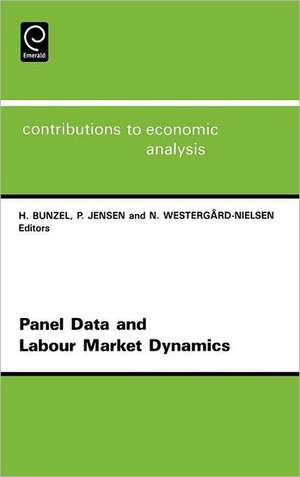Panel Data and Labour Market Dynamics: Contributions to Economic Analysis, cartea 222
Autor Peter Jensen, Niels C. Westergard-Nielsen Editat de H. Bunzelen Limba Engleză Hardback – 10 noi 1993
Din seria Contributions to Economic Analysis
- 9%
 Preț: 802.42 lei
Preț: 802.42 lei - 23%
 Preț: 1071.35 lei
Preț: 1071.35 lei - 23%
 Preț: 1023.59 lei
Preț: 1023.59 lei - 23%
 Preț: 932.12 lei
Preț: 932.12 lei - 23%
 Preț: 1258.06 lei
Preț: 1258.06 lei - 23%
 Preț: 1125.47 lei
Preț: 1125.47 lei - 23%
 Preț: 1072.71 lei
Preț: 1072.71 lei - 23%
 Preț: 1134.25 lei
Preț: 1134.25 lei - 23%
 Preț: 1025.01 lei
Preț: 1025.01 lei - 23%
 Preț: 928.43 lei
Preț: 928.43 lei - 23%
 Preț: 1327.58 lei
Preț: 1327.58 lei - 23%
 Preț: 1090.22 lei
Preț: 1090.22 lei - 23%
 Preț: 1196.60 lei
Preț: 1196.60 lei - 23%
 Preț: 928.84 lei
Preț: 928.84 lei - 23%
 Preț: 1061.82 lei
Preț: 1061.82 lei - 23%
 Preț: 1113.58 lei
Preț: 1113.58 lei - 23%
 Preț: 874.46 lei
Preț: 874.46 lei - 19%
 Preț: 673.76 lei
Preț: 673.76 lei -
 Preț: 333.43 lei
Preț: 333.43 lei - 23%
 Preț: 1264.34 lei
Preț: 1264.34 lei - 23%
 Preț: 1323.45 lei
Preț: 1323.45 lei - 23%
 Preț: 1261.24 lei
Preț: 1261.24 lei - 23%
 Preț: 1099.44 lei
Preț: 1099.44 lei - 23%
 Preț: 1149.25 lei
Preț: 1149.25 lei - 23%
 Preț: 836.47 lei
Preț: 836.47 lei - 23%
 Preț: 854.99 lei
Preț: 854.99 lei - 23%
 Preț: 1125.37 lei
Preț: 1125.37 lei - 23%
 Preț: 932.57 lei
Preț: 932.57 lei - 23%
 Preț: 1266.20 lei
Preț: 1266.20 lei - 23%
 Preț: 1018.90 lei
Preț: 1018.90 lei - 23%
 Preț: 1398.42 lei
Preț: 1398.42 lei - 23%
 Preț: 1299.72 lei
Preț: 1299.72 lei - 23%
 Preț: 1221.55 lei
Preț: 1221.55 lei - 23%
 Preț: 1134.89 lei
Preț: 1134.89 lei - 23%
 Preț: 928.43 lei
Preț: 928.43 lei - 23%
 Preț: 930.35 lei
Preț: 930.35 lei - 23%
 Preț: 1028.12 lei
Preț: 1028.12 lei - 23%
 Preț: 895.88 lei
Preț: 895.88 lei - 23%
 Preț: 1096.14 lei
Preț: 1096.14 lei - 23%
 Preț: 999.71 lei
Preț: 999.71 lei - 23%
 Preț: 1052.38 lei
Preț: 1052.38 lei - 23%
 Preț: 1045.56 lei
Preț: 1045.56 lei - 23%
 Preț: 1255.61 lei
Preț: 1255.61 lei - 23%
 Preț: 1076.51 lei
Preț: 1076.51 lei - 23%
 Preț: 1042.59 lei
Preț: 1042.59 lei
Preț: 1204.17 lei
Preț vechi: 1563.86 lei
-23% Nou
Puncte Express: 1806
Preț estimativ în valută:
230.45€ • 239.70$ • 190.25£
230.45€ • 239.70$ • 190.25£
Carte tipărită la comandă
Livrare economică 15-29 aprilie
Preluare comenzi: 021 569.72.76
Specificații
ISBN-13: 9780444815484
ISBN-10: 0444815481
Pagini: 508
Dimensiuni: 156 x 234 x 29 mm
Greutate: 0.89 kg
Ediția:New.
Editura: Emerald Group Publishing Limited
Seria Contributions to Economic Analysis
ISBN-10: 0444815481
Pagini: 508
Dimensiuni: 156 x 234 x 29 mm
Greutate: 0.89 kg
Ediția:New.
Editura: Emerald Group Publishing Limited
Seria Contributions to Economic Analysis
Cuprins
Preface. Macro matching and micro search durations looking inside the black box of job formation (M. Lindeboom, J. van Ours). Job match quality over the business cycle (A. Bowlus). Estimating an equilibrium search model from wage data (G.J. van den Berg, G. Ridder). Wage dispersion with homogeneity: The empirical equilibrium search model (N.M. Kiefer, G.R. Neumann). Measurement of job exits: What difference does ambiguity make (T.J. Devine). Job separations in an efficient turnover model (R. Winkelmann, K.F. Zimmermann). Unemployment data, from surveys and administrative registers (K. Albæk, A.H. Larsen). Reservation wages, wage offer distribution and accepted wages (C.M. Schmidt, R. Winkelmann). Data inaccuracies and sampling plan in a model of unemployment duration (N. Torelli, U. Trivellato). Testing for state dependence effects in a dynamic model of male unemployment behaviour (G. Flaig, G. Licht, V. Steiner). Heterogeneous duration dependence: Econometric methods and empirical evidence (P. Jensen). Inferential separation in the prototypal search model (B.J. Christensen, N.M. Kiefer). Efficiency considerations in tobit models with fixed effects (B.E. Honoré). Estimation of limited dependent variable habit persistence models on panel data with an application to the dynamics of self-employment in the former East Germany (M. Lechner). The labour market behaviour of Danish lone mothers (N. Smith, I. Walker, N. Westergård-Nielsen). The effects of labour market training on wages and unemployment: Some Danish results (P. Jensen et al.). Insiders and outsiders in the Danish labour market. An empirical study (N.H. Bjørn, T.M. Pedersen). Mobility and individual earnings growth (T. Eriksson). Inter-industry wage premiums and labour mobility (K. Albæk, E. Strøjer Madsen). Job and worker flows in U.S. manufacturing (D.T. Mortensen). Search, matching and unions (K. Burdett, R. Wright). Benefits, insurance, and implicit contracts (I.S. Mikkelsen). An object-oriented approach to managing panel and duration data (H. Bunzel). Information sources and equilibrium wage outcomes (D.T. Mortensen, T. Vishwanath).
















